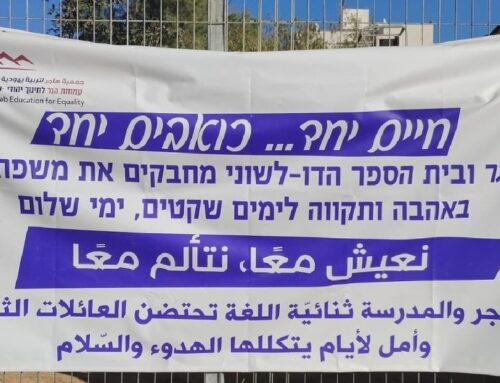I AGREE WITH MICHAEL LAME THAT WE NEED SOME FRESH THINKING.— LILLY
The “peace process” in the Middle East lurches along from crisis to crisis. Since President Obama took office, George Mitchell has served as his special envoy to the region, with his energies focused primarily on bringing the Israeli-Palestinian conflict to a peaceful conclusion. Yet the primary diplomatic subject of conversation about the conflict in 2009-10 has been 1) how to re-start direct talks between the parties, and 2) how to keep them going. A few substantive matters have also been on the agenda – continued Israeli settlement activity in the West Bank and east Jerusalem; an easing of the Gaza blockade; and the Jewishness of the state of Israel that Palestinians will be asked to acknowledge. But no meaningful discussion has taken place on the most basic issues: refugees, Jerusalem, borders, security.
Saeb Erekat, the PLO’s chief negotiator for many years now, gave an impassioned, if slightly irrational speech, at the Middle East Institute’s annual conference last week, before going on to the Woodrow Wilson Center for a public conversation with Aaron David Miller. During his MEI talk and the Q&A, he repeated the phrase “two-state solution” dozens of times. Since President Obama favors a two-state solution, Erekat asked rhetorically, why wouldn’t he support a UN Security Council resolution in support of a unilaterally-declared Palestinian state based on the 1967 borders? But Erekat certainly knows that the President won’t support such a move, as the U.S. State Department spokesperson P. J. Crowley made clear the next day.
According to Asharq Al-Awsat newspaper coverage of the Wilson Center event, Erekat said that “we have concluded the issue of negotiations, and now is the time for decisions, for everybody knows the form of the solution, we know where territory exchange will take place and we have found a solution to eastern Jerusalem and the mechanism that will determine this, and we also know the solution to the issues of refugees and security.” This is a demonstrably false statement. The Abbas and Netanyahu governments have not discussed Jerusalem and refugees, the conversation about borders has not begun in earnest, while both sides wrangle over a continuation of Israel’s settlement moratorium (or rather the partial slowdown of building in the West Bank).
Perhaps Erekat was referring to former Prime Minister Olmert’s offer to Abbas in 2008, but that offer was not accepted by Abbas and is no longer on the table. Regarding the final status issues, the two sides have not yet agreed on almost anything. I say “almost” because one element of a future deal has been clear since Israel evacuated all settlers and soldiers from Gaza in 2005: a Palestinian state will include 100% of the Gaza Strip. If previous negotiations are any guide, it will also comprise more than 90% of the West Bank, but whether that’s closer to 90% or to 100% is unknown. A narrowing of differences does not constitute a meeting of the minds.
Why do the parties continue to employ the same representatives, like Erekat, in round after round of negotiations when these representatives have failed time after time to achieve peace? When is failure in the Middle East ever grounds for dismissal? ….
One can read the rest of this piece at the “Re-Think The Middle East” website.






Meretz reps never cease to amaze me by putting forth views that I expect to come from Likudniks.
Singling out Erekat as a problem is humorous. Israel could not have more compliant Palestinian negotiators than Erekat and Abbas. Most Palestinians are worried that Abbas, Erekat and Abed Rabbo will sell them out, yet even the leftist Meretz USA leadership complains about these Palestinians. What more do you want, someone negotiating for the Palestinians who fully represents Israel’s interest?
I don’t like Thomas Friedman, but he at least had one thing right recently when he said that Israelis are asking to “have Abu Mazen sing Hatikva in perfect Yiddish.”
I had assumed it was people more to the right who were unable to see that Israel would never have more compliant Palestinian negotiators.
Yes, new negotiators are needed, but not because Erekat, Abed Rabbo and Abbas are towing any kind of hard line for Palestinians, but because they have failed for years, and have given Israel too much. Because they’ve lost most Palestinians’ respect, it is questionable that any agreement they negotiate can be enforced.
On the other hand, one obvious person we should all agree to get rid of who goes completely unmentioned by Lame and Lilly is Dennis Ross, among those labeled by his own ex-colleague, Aaron Miller, as Israel’s lawyer. Yet the US government has rewarded Ross for 20 years of failure with continued advancement, and US institutions treat this failed man as a leading expert. I guess we should be thankful that Martin Indyk finally has no formal role.
Ted
Ted
What you are confirming is that it is all a matter of degree. Both Israelis and Palestinians rue the lost opportunities at various stages of the incredibly prolonged peace process.
I agree with your take that the lack of progress at present may be laid at the door of Netanyahu and his coalition, which is “rabidly” Nationalistic and right-wing, much more than the faults of the Palestinian Authority.
I hold Barak largely responsible for the meltdown in the fortunes of the Labour party he ostensibly leads. He did not learn the lessons of history that whenever Labour entered coalition with the right wing, Labour came out very weak and Likud/ Kadimah/ Herut/ Yisrael Beiteinu were strengthened. The sooner Labour walks out of the Government the better.
Meretz was wise to stay in opposition but for different reasons was dealt a blow in Israel’s last elections.
Also I admired Tzipi Livni for not compromising with Netanyahu and staying in opposition.